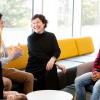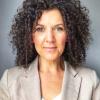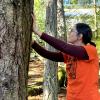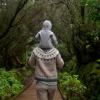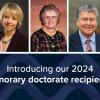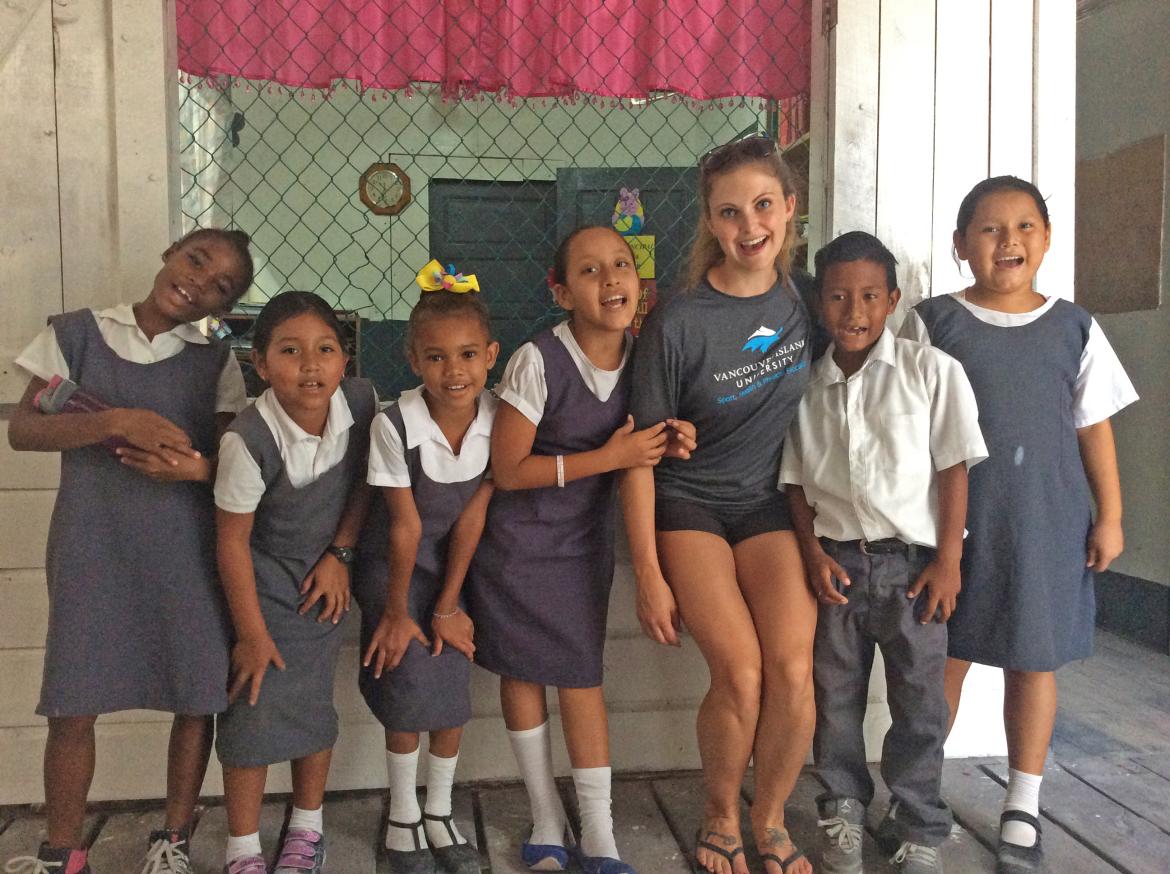
Sport, Health and Physical Education (SHAPE) student Brianna Urlacher poses with students aHoly Cross Anglican School in the San Mateo district in Belize during a recent field school trip.
September 17, 2018 - 4:00pm
Students create portfolios describing how what they learned translates to the workforce
Fourth-year Sport, Health and Physical Education (SHAPE) student Rory Marshall learned a lot on a recent field school to Belize. Thanks to SHAPE’s new collaboration with Vancouver Island University’s (VIU’s) Centre for Experiential Learning, he can relate his experiences to specific skills employers are looking for.
Marshall participated in SHAPE’s field school to Holy Cross Anglican School in the San Mateo district in Belize. VIU students were there to teach various physical activity and sport programs to students, and practice different teaching techniques. The unique part of the field school was that every student was required to create an online portfolio that included a section outlining what skills were learned, both on the trip and throughout each student’s time at VIU, and how they are valuable to employers.
“The intention was to teach students how to put what they learned from that educational experience in the language employers speak,” says Alexis Beaubier, Cooperative Education and Internship Coordinator with the CEL. “It helps students capitalize on what they’ve learned not only in the classroom but also in the field and shapes it in a way that means something to everybody – not just the person who went through those experiences.”
One skill Marshall worked on while in Belize was his adaptability skills – something he says is difficult to practice fully in a classroom setting but is vital to working in many fields. A paramedic as well as a VIU student, Marshall wants to pursue a career as a Physician Assistant with the Canadian Military.
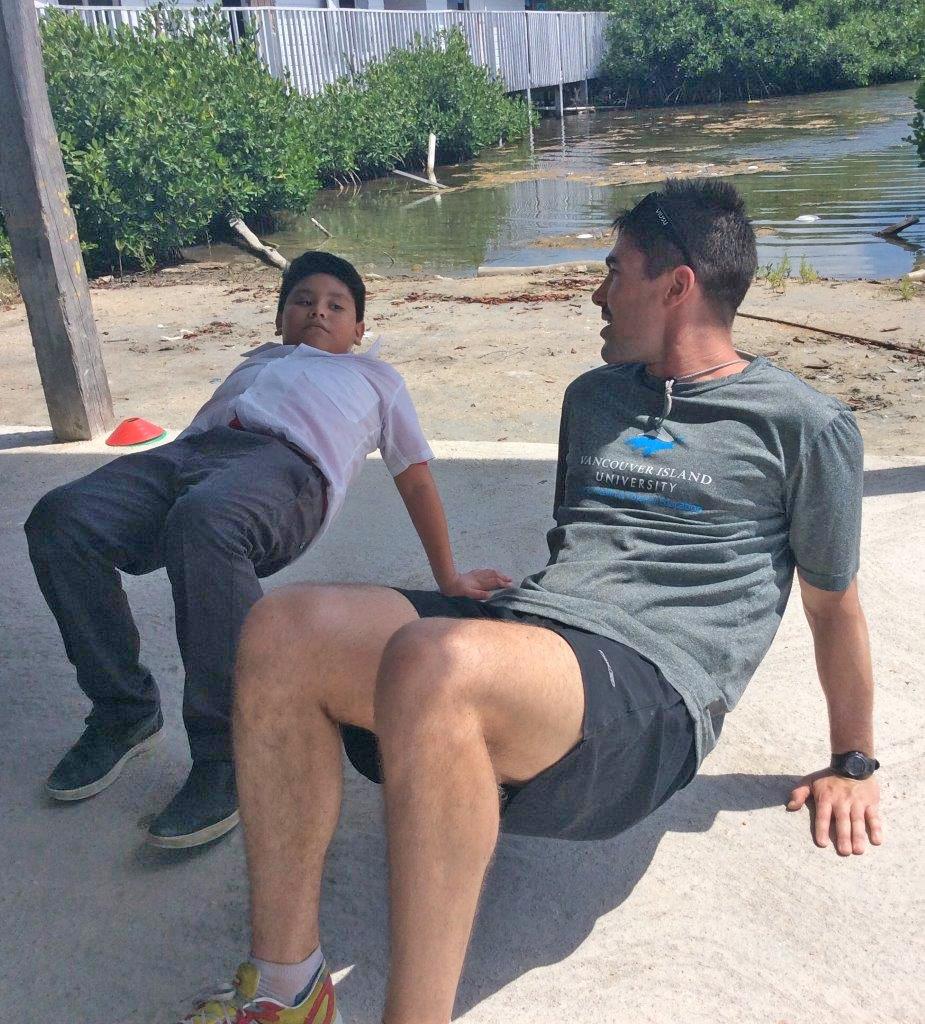 “The first day was such a learning curve – we realized quickly that the traditional sports model we teach in Canada doesn’t necessarily apply,” he says. “The kids didn’t have a background playing team sports the same way Canadian students do, so we had to take a more individualized approach. We were also teaching in a big, dirt area next to the school, which also served as the parking lot of the movie theatre in the evening. I appreciated very quickly what I had back home when I saw what they were doing with so few resources. Plus, the heat was overwhelming, so it was hard to ask much of the kids when temperatures were in the mid- to high-thirties. The ability to develop a plan, assess the situation, adapt the plan, then effectively implement the revised plan while continually assessing and adjusting was a major takeaway. It definitely helped keep my problem solving and analyzation skills sharp!”
“The first day was such a learning curve – we realized quickly that the traditional sports model we teach in Canada doesn’t necessarily apply,” he says. “The kids didn’t have a background playing team sports the same way Canadian students do, so we had to take a more individualized approach. We were also teaching in a big, dirt area next to the school, which also served as the parking lot of the movie theatre in the evening. I appreciated very quickly what I had back home when I saw what they were doing with so few resources. Plus, the heat was overwhelming, so it was hard to ask much of the kids when temperatures were in the mid- to high-thirties. The ability to develop a plan, assess the situation, adapt the plan, then effectively implement the revised plan while continually assessing and adjusting was a major takeaway. It definitely helped keep my problem solving and analyzation skills sharp!”
Experiential learning is a cornerstone of the curriculum in the department of Sport, Health & Physical Education. Professor Rick Bevis has run study abroad programs for the past 15 years, travelling to various locations in the Global South as well as Europe. The topic may vary from location to location, but the goal of having students gain valuable socio-cultural perspectives in their field of study has always been the same.
The Belize field school took place from April 27 to May 7. Bevis says this new dual approach to the field school – both learning course materials by doing and figuring out how those skills apply to what employers are looking for in employees – was powerful and the response they had from students was overwhelmingly positive.
“This field school experience is fully captured because it has been thought about deeply, including how it will shape students’ ideas and personalities, as well as their marketability as highly skilled employees,” he says. “Whether they are applying for graduate programs or jobs, we feel we’ve given them tools to market themselves effectively.”
Beaubier says one common interview question almost all students now have an answer for is giving an example of a time when they failed or had to adapt to a situation that was not what they expected.
“When the students write the skill statements, they are forced to think, ‘What did I learn in school that prepared me to do that, and what proof do I have?’” she says.
“It contributed to feelings of real pride in their accomplishments,” adds Bevis.
For Marshall, it means the field school is forever preserved.
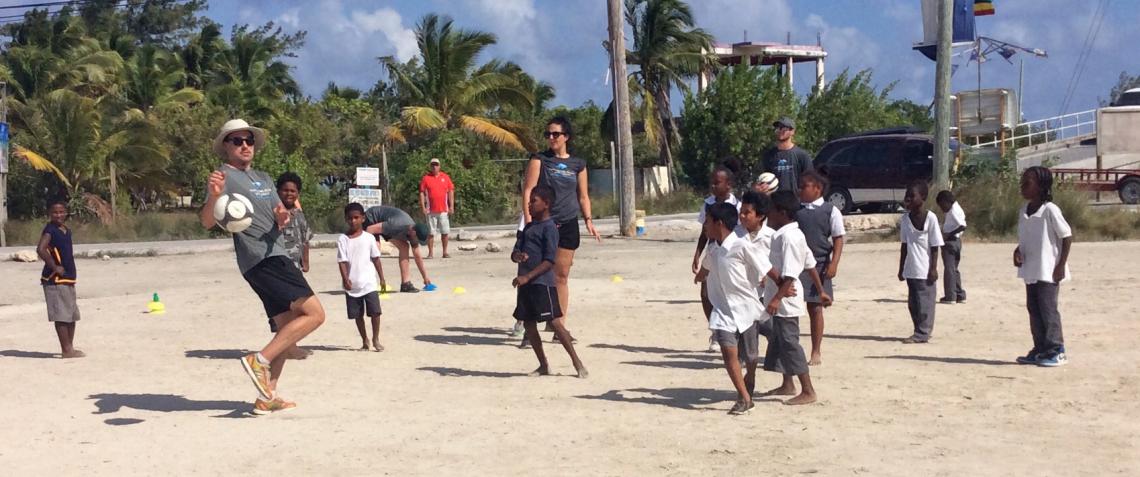
“So many people go on a field school and when they are asked how it went, all they say is, ‘It was amazing,’” he says. “Having the portfolio was a great way to look back on the whole experience and say, ‘Well, I did this and this and this.’”
To learn more about how the Centre for Experiential Learning can support new or existing field schools, visit CEL.
-30-
MEDIA CONTACT:
Jenn McGarrigle, Communications Officer, Vancouver Island University
P: 250.740.6559 | C: 250.619.6860 | E: Jenn.McGarrigle@viu.ca | T: @VIUNews
Tags: Education | SHAPE | Teaching and Learning

